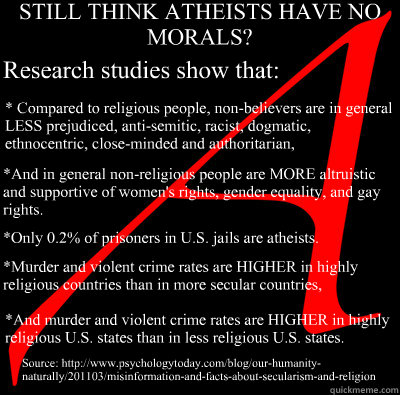
You are soon going to see this trumpeted to the skies, from our media that won’t miss a chance to kiss the rump of religion:
People who regularly visit a place of worship are less likely to get involved in low level crime and delinquency, according to new research.
A survey from Manchester University found a direct correlation between higher visits to religious places and lower crime figures, especially in relation to shoplifting, drug use and music piracy.
So how exactly do we know this?
As part of the project, more than 1,200 18 to 34-year-olds from across all the UK’s major faiths were were asked about their worshipping habits.
They were also asked about any past misdemeanours, and the likelihood they would commit low-level crimes in the future.
In total, researchers asked respondents about eight varying types of delinquency including littering, skipping school or work, using illegal drugs, fare dodging, shoplifting, music piracy, property damage and violence against the person.
Although the study found varying degrees of correlation between increased church visits and decreased crime rates, the most significant were seen in relation to shoplifting, the use of illegal drugs and music piracy.
And the esteemed researchers are quick to jump to a few unwarranted conclusions:
Researchers believe this is because religion not only teaches people about ‘moral and behavioural norms’, but also spending time with like-minded people makes it less likely they’ll get mixed up with the ‘wrong crowd’.
OK, a few criticisms.
First, like many similar studies, this one neglects one minor point. That is, it relies on self reporting of crimes, and as such, is open to confirmation bias. It would be helpful if the surveyors actually checked the criminal records of the participants to see how truthful they have been in answering the questions, but we don’t have the data on that.
Second, and more obviously perhaps, even if the relationship is real, correlation does not mean causation. Puzzlingly, the investigators have completely ignored this, and proceeded to speculate on mechanisms of how religiosity makes you less likely to be a criminal…without ever having established that in the first place.
And last but not least, the researchers seem to have ignored the prior body of evidence which suggests in healthier, more functional societies (and that includes less crime), are less religious. And in this case, unlike the study presented here, there are multiple lines of evidence favoring causality, from societal health to low religiosity: longitudinal studies have shown that in such societies religiosity decreases over time, and also the youth are less religious than the elderly (unlike the more traditional ones, in which the youth are fully as religious as their elders).
It is unfortunate that the papers would run with this and put up titles such as “how religion cuts crime” (not that it doesn’t, but we certainly can’t tell, with the available data). But we can expect religiously affiliated outlets to take a lot of mileage out of this.
